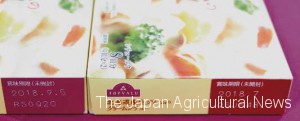
A photo shows Aeon Co.’s private-label product with the previous best-before date labeling (left) and the same product with the new year-month label.
TOKYO, Oct. 29 – More food manufacturers and retailers are adopting durable life labeling of a year and month without a day instead of best-before dates in a bid to provide extended best-before period for food products and reduce unnecessary disposal and discounts, as “food loss” – discarding food which can still be eaten – is increasingly becoming a social issue.
The new labeling, introduced mainly for processed foods such as seasonings and beverages, also helps to improve the efficiency of distribution and inventory management, and many companies are likely to follow suit.
According to the Ministry of Agriculture, Forestry and Fisheries, some 6.21 million tons of food that are still believed to have been edible were disposed of in Japan in 2014. The farm ministry and the Ministry of Economy, Trade and Industry’s panel have been working with food companies and retailers to revise the durable life labeling. The move is also supported by the logistics industry which is suffering from shortage of truck drivers and warehouse workers.
Already in February, major food maker Ajinomoto Co., Inc. changed the durable life labeling terms for its three Chinese seasoning products to an indication of a year and month only. In August, the firm extended the terms to 73 items including instant soup products and hot pot seasonings, and plans to adopt the new labeling to 90 other items by the end of the 2019 business year.
Suntory Beverage & Food Ltd. will expand the number of beverage products subject to the new labeling starting in January next year. The firm says the labeling for roughly 80 items in nine brands will be changed by the end of the 2018 business year, meaning some 90 percent of its products will bear the year and month labels. “This will reduce the disposal and management work, thus helping to cut costs,” said a company official.
Major retailer Aeon Co., Ltd. will set on changing the durable life labeling of its private-brand processed food products starting in April next year, becoming the first retailer to do so. The firm will start with the labeling for honey, stew products and seasonings for kamameshi rice, meat and vegetables served in small pots. It plans to change the labeling for all of its private-brand products with a durable life of more than a year by autumn 2019.
According to Aeon officials, Aeon Group disposes of some 160,000 tons of food a year. The firm is aiming to halve the amount of its food loss by 2025 through expanding recycling of resources, such as composting food scraps thrown away during the process of preparing fresh produce or making ready-to-eat foods.
There has traditionally been a practice among supermarkets in Japan of not allowing food makers and wholesalers to deliver food products with one-third of their duration life – period between production date and best-before date – passed. This practice should be reviewed from the aspect of both improving food manufacturers’ profits and trading farm produce used as ingredients at fair prices.

